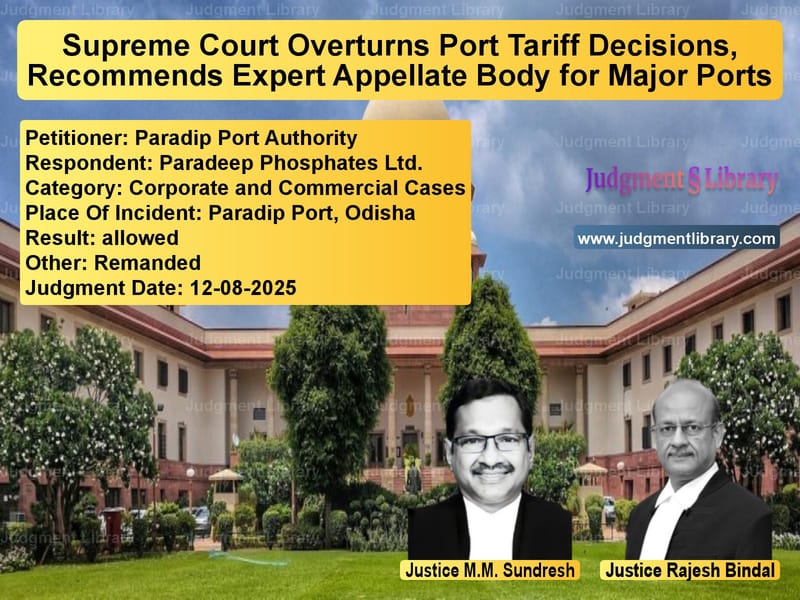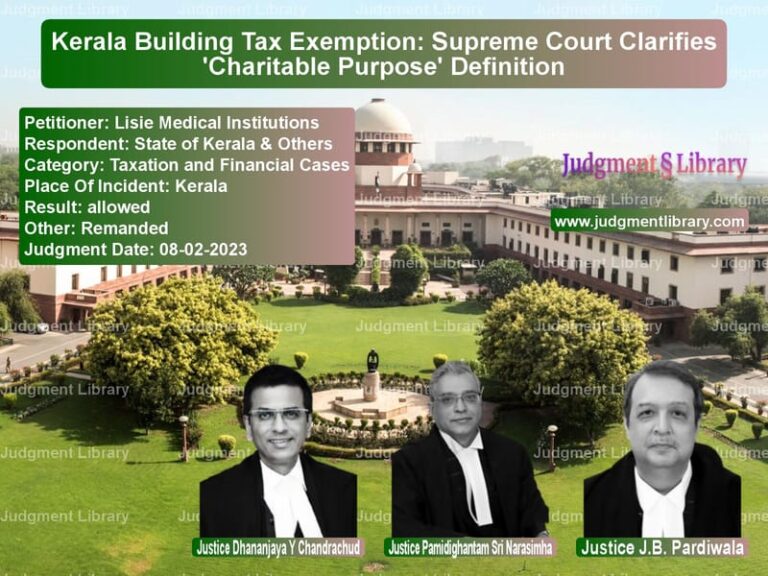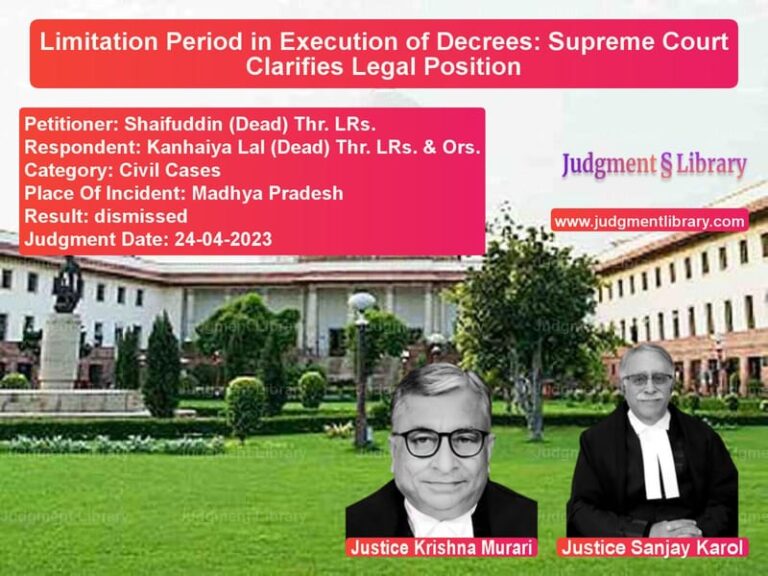Supreme Court Overturns Port Tariff Decisions, Recommends Expert Appellate Body for Major Ports
In a landmark judgment that could reshape India’s port regulatory framework, the Supreme Court has overturned multiple decisions in a long-standing dispute between Paradip Port Authority and Paradeep Phosphates Ltd. The case, which involved tariff revisions spanning nearly three decades, has highlighted significant gaps in the current regulatory system for major ports. The Court’s ruling not only resolves the immediate dispute but also recommends fundamental changes to how port tariff appeals are handled in the future.
The dispute originated from a 1985 agreement between Paradip Port Trust (now Paradip Port Authority) and Paradeep Phosphates Ltd, which was then a public sector unit. The agreement provided for exclusive use of a ‘fertilizer berth’ by the company at specified rates. The crux of the conflict emerged when the Port Authority sought to revise these tariffs in 1993, leading to decades of litigation through various forums including arbitration, appellate authorities, and finally the High Court before reaching the Supreme Court.
Mr. Jaideep Gupta, learned senior counsel appearing for the appellant/Authority, made compelling arguments about the contractual and statutory framework. He submitted that “Clause 19 of the Agreement clearly provides that the respondent shall be subjected to the application of all relevant laws, rules and regulations of the Authority as may be enforced from time to time.” He emphasized that the initial agreement from 1985 could not possibly fix tariffs for all time, especially when costs and overheads had increased substantially over the years.
The Port Authority’s counsel also highlighted the respondent’s conduct, noting that “the respondent continued to pay the revised tariff without any objection till the time the aforesaid civil suit dated 30.06.2000 was filed.” This, he argued, indicated acceptance of the revised rates. He further contended that any claim for refund was time-barred under Section 55 of the 1963 Act, which required such claims to be filed within six months.
On the other side, Mr. Shyam Divan, learned senior counsel appearing for the respondents, defended the lower court decisions. He argued that “the issue has already been examined at three different levels, namely, Arbitrator, the Appellate Authority and thereafter in a Writ Petition by the High Court. There are concurrent findings of fact.” He emphasized that the scope of interference by the Supreme Court should be minimal unless there was grave error.
The respondent’s counsel stressed the contractual nature of the relationship, stating that “Clause I thereof in fact is a primary clause. The tariff rates have been agreed upon. It further provides that the increase, if any, in future can only be with mutual agreement.” He argued that in case of failure to mutually agree, the dispute should be resolved through independent third-party mechanisms like arbitration, not unilateral imposition of new rates.
After examining all arguments and the extensive record, the Supreme Court found fundamental errors in how the dispute had been handled at various levels. The Court expressed surprise that “the Arbitrator, Appellate Authority and also the High Court did not find any justification for revision of rates which were fixed way back in the year 1985 till 1999.” The Court noted that during this period, costs of inputs and services must have increased manifold, making some tariff revision inevitable.
The Court was particularly critical of the Appellate Authority’s approach, observing that “the same is totally cryptic. Being the first Appellate Authority, it was incumbent upon it to re-examine the facts in terms of the law applicable.” Similarly, the Court found that the High Court had “totally misdirected itself by holding that the Agreement will override the provisions of the 1963 Act.”
In its analysis, the Court emphasized the role of expert bodies in tariff determination. The judgment noted that “TAMP being an independent authority consisting of experts, will be the right authority for resolution of dispute between the parties, which is pending for more than two decades.” This recognition of specialized expertise became a central theme in the Court’s final directions.
The Court also found procedural irregularities in how TAMP had handled the matter, particularly regarding natural justice. The judgment noted that “it is a clear case of violation of principles of natural justice” as the parties were not given proper opportunity to explain complicated factual issues during hearings.
In a significant portion of the judgment, the Court addressed the broader issue of appellate mechanisms for port tariff disputes. Drawing parallels with other regulatory sectors, the Court observed that “fixation of tariff would involve consideration of various factual aspects, especially figures involved. This Court may not have the expertise to examine the accounts in detail for the purpose of fixation of tariff.”
The Court referenced its earlier judgment in W.B. Electricity Regulatory Commission v. CESC Ltd., where it had noted that “it would be more appropriate and effective if a statutory appeal is provided to a similar expert body, so that the various questions which are factual and technical that arise in such an appeal, get appropriate consideration in the first appellate stage also.”
The judgment highlighted the growing importance of India’s major ports, noting that “the workload of Major Ports in India has doubled, registering a 7.5% Compound Annual Growth Rate over 10 years and handled 819.227 million tonnes of cargo in Financial Year 2023-24.” This growth, the Court reasoned, necessitates more specialized dispute resolution mechanisms.
The Court compared the port sector with other regulated industries where specialized appellate tribunals exist, including securities, telecommunications, competition, electricity, and company law. This comparative analysis strengthened the Court’s recommendation for reform.
In its final directions, the Court set aside all previous orders and remitted the matters back to TAMP for fresh consideration. The Court specified that “the matter is remitted to the TAMP for adjudication of the dispute regarding revision of tariff applicable to the respondent for the period from October 1993 till 31.03.1999” and subsequent periods.
Most significantly, the Court made a formal recommendation for structural reform, stating that “it would be appropriate if an expert appellate body is constituted to hear appeals against the orders passed by the adjudicatory board/TAMP.” The Court directed its Registry to send a copy of the judgment to the Legislative Department for appropriate action.
This judgment represents a significant development in India’s port regulatory framework. By emphasizing the need for expert handling of technical tariff matters and recommending the creation of a specialized appellate body, the Supreme Court has potentially set the stage for major reforms in how port disputes are resolved. The decision balances the need for contractual certainty with the practical reality of changing economic conditions, while also addressing systemic issues in the current regulatory architecture. As India’s ports continue to grow in importance for the nation’s economy, this judgment could have far-reaching implications for future port development and regulation.
Petitioner Name: Paradip Port Authority.Respondent Name: Paradeep Phosphates Ltd..Judgment By: Justice M.M. Sundresh, Justice Rajesh Bindal.Place Of Incident: Paradip Port, Odisha.Judgment Date: 12-08-2025.Result: allowed.
Don’t miss out on the full details! Download the complete judgment in PDF format below and gain valuable insights instantly!
Download Judgment: paradip-port-authori-vs-paradeep-phosphates-supreme-court-of-india-judgment-dated-12-08-2025.pdf
Directly Download Judgment: Directly download this Judgment
See all petitions in Contract Disputes
See all petitions in Commercial Arbitration
See all petitions in Judgment by M.M. Sundresh
See all petitions in Judgment by Rajesh Bindal
See all petitions in allowed
See all petitions in Remanded
See all petitions in supreme court of India judgments August 2025
See all petitions in 2025 judgments
See all posts in Corporate and Commercial Cases Category
See all allowed petitions in Corporate and Commercial Cases Category
See all Dismissed petitions in Corporate and Commercial Cases Category
See all partially allowed petitions in Corporate and Commercial Cases Category







